Sunday, October 6, 12:00
Hadjinikos Hall
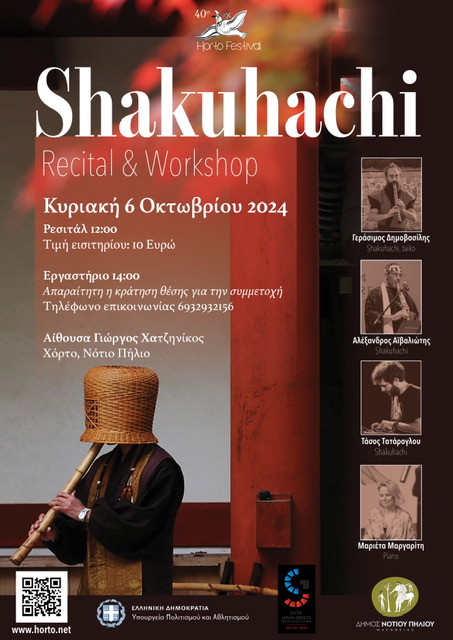
Traditional wind instrument SHAKUHACHI
Performers : Gerasimos Demovassilis, Alexandros Aivaliotis, Tasos Tataroglou, Marietta Margariti
On Sunday 6 October at 12:00 at the George Hadjinikos Hall, in Chorto, there will be a recital of Japanese traditional and contemporary music with the shakuhachi (尺八) flute as the main instrument. The works will be performed by the musicians Gerasimos Demovassilis, Alexandros Aivaliotis, Tasos Tataroglou on shakuhachi and Marietta Margariti on piano.
The repertoire that will be presented will include mainly traditional pieces of the meditative repertoire Hon Kyoku (本曲) of the Zen monks Komuso, in duet and solo, while more contemporary creations and compositions by the performers Gerasimos Demovassilis and Tasos Tataroglou will also be presented.
At 14:00 there will be a workshop on the shakuhachi in which there will be an extensive presentation of the instrument, both historically, musically and constructionally. The various types of shakuhuhachi as well as the main musical idioms it has played over the centuries will be presented. The way of writing music as well as its relation to meditation. There will be musical instruments available for participants and a first lesson will be given to experience shakuhachi. Seating will be limited and reservations are required.

“The event takes place in the context of the commemorative activities of the Embassy of Japan in Greece on the occasion of “2024: Year of Culture and Tourism between Japan and Greece”
About the Shakuhachi below is a relevant information note:The shakuhachi (尺八)is perhaps the most widespread and expressive flute genre in the Japanese musical tradition. Particularly widespread during the Edo period (1615-1868) in Japan, it has a long history and a rich repertoire which has survived to the present day. It was used both by the samurai and as a spiritual tool of the wandering Komuso (虚無僧) or Monks of Emptiness, the Fuke sect (普化宗). In recent decades, alongside its traditional repertoire, its widespread use worldwide in many contemporary musical idioms has flourished.
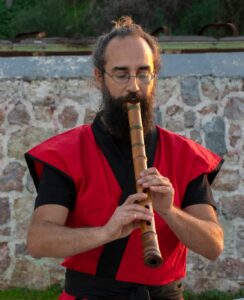 Gerasimos Demovassilis
Gerasimos Demovassilis
Gerasimos Demovassilis was born in Athens in 1977. He began learning the Japanese flute shakuhachi in 2002 and specialized initially in the traditional Honkyoku repertoire, studying with renowned teachers from Europe and Japan. Since 2011 he has been focusing exclusively on the Kinko Ryu style of the Chikumeisha school, taking lessons from Gunnar Jinmei Linder and expanding his repertoire to Honkyoku and Jiuta Sokyoku pieces playing with Koto & Jiuta Shamisen. He currently holds the Jun Shihan diploma of the Chikumeisha school and delivers shakuhachi lessons in Greece. At the same time he has started translating the book “Beginner’s Guide for Kinko Ryu Shakuhachi” by his teacher Gunnar Jinmei Linder. Besides his involvement with shakuhachi he is active as a civil engineer and music therapist, and is a member of the Japanese percussion group Atene Daiko.
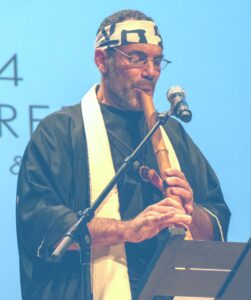 Alexandros Aivaliotis
Alexandros Aivaliotis
Born in 1977 in Thessaloniki, Greece. Since 2010 he has a degree in flutist and a degree in music theory. He studied at the Municipal Conservatory of Thessaloniki, the Symphony Conservatory and the Central Conservatory. Since 1998 he has been involved in a wide range of classical and traditional Japanese martial arts and Japanese culture in general (Master’s degree in linguistics in 2015 with a thesis on the koans of Rinzai Zen) and attending seminars on Japan’s strategy and leadership at the National University of Athens in 2022. Since 2012 she has been involved in Japanese straightforward shakuhachi, sakuhachi, through the Kokusai Shakuhachi Kensūkan school and teacher Kyle Chōmei Kamal Helu with presentations, recitals and concerts to date in Thessaloniki and Athens.
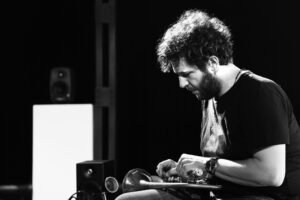 Tasos Tataroglu
Tasos Tataroglu
Tasos Genpō 玄峰Tataroglou is a musician, composer, improviser, choir director and researcher, born in 1985 in Thessaloniki. He lives and works in Basel since 2013. He studied classical trumpet, higher theory, contemporary singing, musicology and pedagogy. He did postgraduate studies in Free Improvisation with Fred Frith & Alfred Zimmerlin at the Basel Academy, as well as choir conducting studies with Martin Wettges. He studies shakuhachi with Seian Genshin & Josen (Jon Kypros) the Myoan and Seien Ryu styles in reverse. In 2024 he received the name Genpō 玄峰 from Seian Genshin, abbot of the Myoan-ji temple in Kyoto, which means Mysterious Mountain Top. In June 2023, he presented his research on the interpretation of Honkyoku (original pieces for Sakuhachi) with Microtone – Duplex, a trumpet of his own design, at the International Sakuhachi Festival in Prague (Czech Republic). He has recorded four personal albums and has numerous participations. His book with his performance of Tsuru no Sugomori – Renpoken in Western notation has been recognized by leading shakuhachi players around the world, as well as by academic institutions.
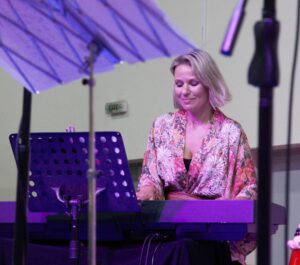 Marietta Margariti
Marietta Margariti
Marietta Margariti is a Diploma Pianist (Excellent unanimously and First Prize), Diploma Pianist (Excellent unanimously and Distinction for outstanding performance) and Excellent Diploma Specialist in Harmony.She is exclusively active in the field of piano pedagogy and is the founder of the “Melodokipos” method, an alternative approach to piano teaching, inspired by her apprenticeship with outstanding pianists and pedagogues (A. Papastefanou, M. Ivanisheva, P. Kanellopoulos etc.) as well as the Steiner-Waldorf pedagogy. He has been co-creator of the music-movement method “Me and You together”, musician of the children’s company “out of the bowl”, has organized numerous thematic performances with a focus on the piano, numerous recitals and is a member of the Afro-Brazilian percussion group Quilombo.
